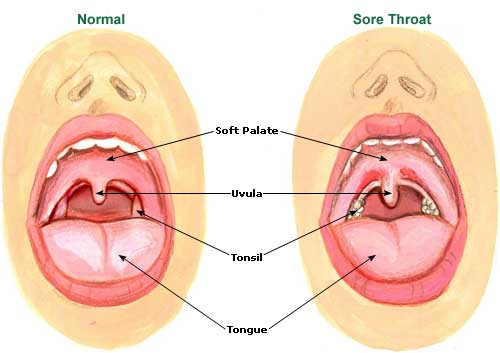
An ulcer is essentially a break in tissue, or a tissue defect, whether that tissue be the skin, the lining in the stomach, or the mucus membranes that line the pharynx, mouth, and esophagus. The word ulcer derives from the Greek word for wound. An ulcer is in fact an open wound, an area from which protective tissue has been torn away, exposing the tissues that lie beneath. It is somewhat different from a cut or a scrape, although it is at times referred to as a lesion. One of the distinctive features of ulcers is that they can sometimes be slow to heal, and being slow to heal increases the risk of a secondary infection taking hold.

Ulcers are not uncommon, and among the most common of them are those of the mouth, which are much more common than those that occur in the throat, one reason being that they are often caused by trauma of some kind, whereas the throat area is more protected against trauma. Even stomach ulcers tend to be more common than those of the throat. Whether it is common or rare, a throat ulcer can be painful and can at times constitute a danger.
What Causes Ulcers?
Ulcers are somewhat of a strange breed. Quite often, their cause seems obvious. In other instances, they appear for no apparent reason. There are a few things that are known to cause ulceration, a few things thought to have caused them but apparently don’t and a number of unknown causes.
There has long been a school of thought that believes that ulcers can be or are caused by stress, although this has yet to be proven. It is likely however that a person’s lifestyle can make a person more prone to having them, but so can a number of other things. In fact, it was not too long ago that certain genetic predispositions, combined with a person’s lifestyle and dietary habits, were considered to be a chief cause of ulceration that sometimes appear in the gastrointestinal system. Even this seemingly dangerous combination has never been proven to cause ulcers, however. The leading cause, and one of the few that has been proven, appears to be bacteria.
[ You Got an Ulcer ? Read this ]
Cause vs. Contributor
It is true is that smoking, alcohol abuse, or an overreliance on aspirin or other pain-killing medications can contribute to the formation of an ulcer. Those who over-indulge in alcohol appear to have a higher likelihood of experiencing an esophageal or pharyngeal ulcer. Still, a distinction has to be made between what is a contributor and what is a cause. What is known is that alcohol, smoking, and pain medications will sometimes slow the healing process in an ulcer and can certainly aggravate an ulceration that is already present.
Infection as the Primary Cause of Throat Ulcers
The primary causes of throat ulcers are respiratory infections that have gone untreated, with the result being damage to the pharyngeal or esophageal lining. The majority of these ulcers occur at the back of the throat in the region of the tonsils. Tonsillitis, in fact, is one of the disorders that can sometimes cause ulceration. The same is true with pharyngitis, which is an inflammation of the pharynx or the back of the throat. Pharyngitis is generally caused by either a streptococcal or viral infection. Chemical irritation can also be a cause, as can acid reflux, where stomach acid damages the lining of the esophagus to the extent that a sore forms, but such instances are relatively rare. Acid reflux disease is much more apt to cause ulcers in the lower part of the esophagus rather than higher up in the pharynx.
Other potential causes of throat ulcers include HIV infection, Epstein-Barr infection, Candida albicans which is more commonly known as oral thrush, and the herpes simplex virus. An Epstein-Barr infection is a viral infection and is the most common cause of infectious mononucleosis.
The Aphthous Ulcer – A Stranger in the Dark
One type of ulcer that can occur in the throat, although it most often affects the mouth or gums, is the aphthous ulcer. It is a rather strange disorder in that it is not caused either by bacteria or by a virus. The cause of this particular type of ulcer is in fact unknown. An aphthous ulcer is a lesion in the mouth or the fauces. It is generally more of a nuisance than it is a danger, although for some people it can become a recurring problem. These ulcers are generally not long lasting and they generally do not cause complications, with the only real danger being the possibility of a secondary bacterial infection.
Herpangina – A Viral Infection in Children
Yet another cause of ulceration in the mouth or pharynx is herpangina. Herpangina is a viral illness that mostly affects children. It appears to be mostly caused by Coxsackie group A viruses. Typical symptoms of herpangina are fever, headache, and a sore throat, but the symptoms can also include throat ulcers. These ulcers are normally small in number, but they can be quite sore. They can be treated with a topical anesthetic if they are quite painful, but in most cases an over-the-counter medication such as an acetaminophen or ibuprofen will suffice.
While it is not all that common, acid reflux disease can at times cause ulceration to occur in the pharynx. If stomach acid succeeds in traveling all the way to the pharynx, as will happen on occasion when one has acid reflux disease, it can affect the mucous membranes and can even affect the vocal cords. Stomach acid is an acid which can be very corrosive when tissues that do not have the protection the stomach lining has are exposed to it. Dealing with throat ulcers caused by acid reflux disease mostly involves techniques designed to prevent the ulcers from occurring in the first place, or to allow any that are already present time to heal. Unfortunately, throat ulcers that have been caused by stomach acid often take a great deal of time to heal. While it is neither necessary nor desirable to completely prevent the formation of stomach acid, it is sometimes desirable to decrease its production through the use of medications. In the case of acid reflux disease, the only way to prevent ulcers from occurring in either the esophagus or throat may be by surgical intervention.
Throat Ulcer Treatments
Aphthous ulcers are generally the easiest to treat, which is fortunate because they tend to be the most common ulcers that occur in the mouth or in the pharynx. As noted previously, what causes aphthous ulcers is not known. They tend to come out of nowhere, and disappear nearly as fast, although they will sometimes hang around for a few weeks. Very often, no treatment is required. When treatment is needed, it generally involves avoiding things that aggravate the ulcers and cause pain, such as spicy foods or very salty foods.
A chlorhexidine mouthwash usually provides a measure of relief, plus it also helps these ulcers to heal more quickly and lessens the chances of a secondary infection occurring. The same can be said for steroid lozenges. Pain killing medications can provide relief, but such relief is usually not long lasting.
Most treatments of ulcers cause by gastro-esophageal reflux disorders address the cause rather than the symptoms, and the ulcer happens to be a symptom. Treatment consists either of lessening the amount of stomach acid that is produced or taking steps to prevent it from moving up into the esophagus and throat. This latter approach often involves surgery. As for the ulcer itself, it mainly needs a chance to heal and the best way to ensure that would be to consult with your doctor, or a nose and throat specialist. Whereas aphthous ulcers or an ulcer caused by bacteria or trauma can be fairly easy to treat, the same cannot always be said for those that have been caused when stomach acid has damaged the mucous membranes. Nevertheless, what provides temporary relief for one type of ulcer will in many cases provide relief for another.
When Your Ulcer Refuses to Leave
A precaution worth heeding is if you have a throat ulcer that simply refuses to heal, you should see a doctor. A wound that does not heal can sometimes, though not always, become cancerous. In any event, an ulcer that lasts a long time can cause significant discomfort and would be something you would normally want to have looked at and cured if home remedies fail to do the job.
There are medications you can take that will provide a measure of relief if you have one or more ulcers in your throat. Some types of ulcers will go away as quickly as they came and require little if any treatment or a need of relief. Other types are more stubborn, take longer to heal, and cause greater discomfort. The best approach in dealing with any of these ulcers would be to see a doctor.
Source :-BetterHealthTips

Leave a Reply